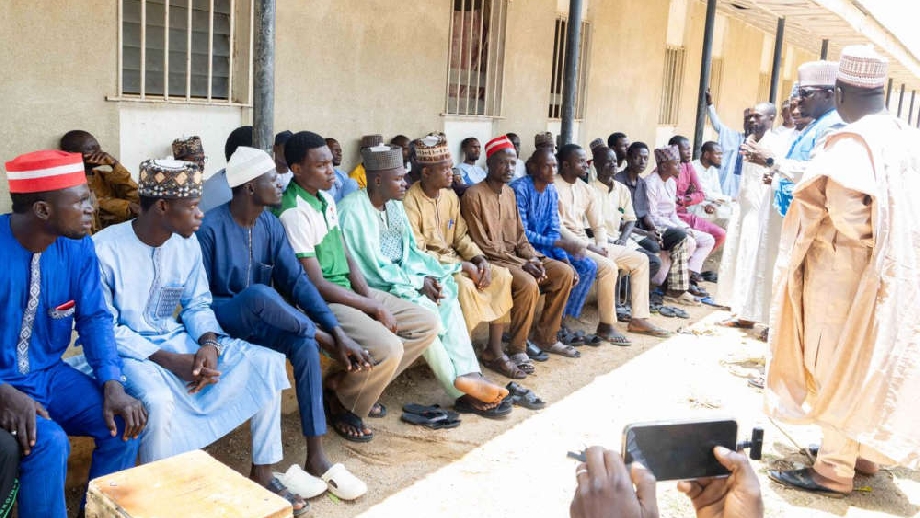
Change is quietly happening in Rano Local Government Area of Kano State.
For decades, family planning was seen by many men as foreign, dangerous, and even against religion and tradition. Today, under the shade of trees and in the chatter of local tea shops, men are beginning to rethink their role in planning their families - thanks to an innovation rooted in what has become their “culture” with time: the Majalisa Forum.
A Personal Journey of Change
Before now, 35-year-old Ibrahim Turaki Aliyu, a tailor in Rano Local Government Area of Kano State, did not believe in family planning. His wife, Habiba, had given birth to three children in quick succession, leaving her constantly fatigued and struggling with poor health.
When Habiba suggested family planning to space out pregnancies, Turaki “strongly opposed it, arguing that it went against his culture and beliefs. Like many men in his community, he saw family planning as a Western idea that undermined traditional values.
Another resident, Aminu Umar Rano, shared similar views. To him, “family planning was simply another foreign culture designed to weaken African families.” Neither of these men considered it an option for their households.
Nigeria’s Growing Population Challenge
According to Statista, Nigeria is projected to become the world’s third most populous country by 2050, after India and China. Its population will hover around 410 million people. The consequences of this growth are already visible. Nigeria currently has one of the highest maternal mortality rates in the world and ranks third in Africa.
Since 2017, maternal deaths have risen by 14% - from 917 per 100,000 live births to 1,047 per 100,000 in 2020. At the same time, fertility rates remain among the highest in the world. The 2023/24 Nigeria Demographic and Health Survey (NDHS) reports a fertility rate of 4.8 and a modern contraceptive prevalence rate (mCPR) of just 15%.
Kano, Nigeria’s most populous state, mirrors these challenges. Its total fertility rate is about 6.8%, with an estimated 1,000 births recorded daily. This rapid growth puts immense pressure on already stretched health facilities. Maternal mortality in Kano stands at 1,047 deaths per 100,000 live births, while child mortality is 103 per 1,000 live births.
Worryingly, only about one-third of deliveries in the state are attended by skilled birth attendants. Also, child birth spacing services are still underutilised, as stockouts, poor access to health facilities, myths, and cultural barriers continue to hold families back from making healthier reproductive choices.
A Community-Led Solution: Majalisa Forums
To address this challenge, a non-governmental organisation, MSI Reproductive Choices, introduced the Majalisa Forum model in Rano in 2024. “Majalisa,” meaning gathering in Hausa, is rooted in an age-old culture. Every day, men gather under trees, at tea shops, or in local community spaces to discuss politics, social issues, and family life.
MSI saw an opportunity here. Instead of expecting men to attend health talks or clinic spaces, they often felt they were inappropriate or intimidating - the organisation brought the conversation to where men already were. Trained male champions and health educators began joining these gatherings. Using storytelling, peer dialogue, and religious references, they guided conversations about child birth spacing.
Rather than lecturing, MSI encouraged open dialogue. Men asked questions, challenged myths such as “family planning causes infertility,” and listened to testimonies from peers who had supported their wives’ reproductive health. Also, health talks and sensitisation on the importance of child birth spacing were discussed at the forum.
Recognising cultural sensitivities, MSI Reproductive Choices also aligned with the Kano State government’s decision to reframe “family planning” as “Child Birth Spacing” to foster greater acceptance. According to Abdullahi Isah, Norms Advisor at MSI Reproductive Choices, the model was designed to “meet men where they are.”
“We realised men in Rano already had a structure where they gathered to talk. So instead of creating a new program, we embedded child birth spacing conversations into their majalisa. It gave men ownership of the process.” He says, “The forums also stress spousal communication. Men are encouraged to see child birth spacing not as a woman’s burden, but as a joint decision that strengthens the whole family.”
Isah adds that more than 50 men gather daily at different Majalisa sessions. He further says, “Myths and stigma around child birth spacing are gradually fading.”
From Resistance to Acceptance
Barely a year after the program began, results are showing. Local health workers report that more men are visiting clinics with their wives, asking questions, and even encouraging long-term methods such as implants and IUDs. At Autan Bawo Clinic and Maternity in Rano, Head Nurse Hajiya Ado Rano noted a dramatic rise in clients. “Before, we received only four to seven clients a day. Now, we see over 100 daily. Many adopt IUDs, implants, and other methods after counselling,” she said.
Still, she notes challenges, including shortages of commodities and the need for continuous training of community mobilizers.
Voices of Change
For men like Ibrahim Turaki Aliyu, who is now enlightened, the forum was life-changing. “I used to think child spacing would make my wife infertile. But after hearing other men share their experiences, I realised it is about giving our wives rest and giving our children a better life. Now my wife is using an implant, and we are both happier.”
Also speaking, his wife Habiba says revealed that “Before, I was always tired. Now I have more energy to care for my children. I know when I am ready for another child, it will be safer for me.”
Similarly, Aminu Umar Rano recalls being persuaded by an elder who shared how his wife’s health improved after child spacing. He says, “I took my wife to the hospital. She is now on an implant, and she is strong again. We can take better care of our children.”
Why the Model Works
During my visit to Rano, I observed that the Majallisa Forum gained acceptance because it is deeply rooted in the community’s culture and values. Apart from the fact that the model is built on existing male spaces rather than imposing new structures, endorsement of child spacing by my community and religious leaders makes it more convincing.
Commenting, the Emir of Rano, Alh. Muhammad Isa Umar says his people are embracing the methods that suit them. “My people now understand that when children are properly spaced, they are healthier and happier, and mothers are stronger. This has reduced the pressure on families,” he said.
The monarch, who has been vocal about the benefits of child birth spacing, “credits Islamic scholars for reinforcing acceptance through Friday sermons, reminding men that spacing births aligns with religious teachings on protecting the health of mothers and children.” He says, “The palace has also partnered with district and village heads to spread the message at the grassroots level.”
Addressing Wider Healthcare Gaps
Despite successes, challenges remain. Some men still associate childbirth spacing with promiscuity or foreign agendas. In addition, stockouts of commodities and long distances to health facilities sometimes discourage families who are ready to act.
Responding, the government says it is expanding services to address these gaps. In December 2024, it launched its Family Planning Strategic Plan in December 2024, targeting 845,114 women between 2025 and 2030.
According to the government, the move aims to increase the prevalence rate of modern contraceptives, which currently stands at 13%. The Adolescent Health Focal Person at the Kano State Primary Healthcare Board, Zara’u Ibrahim, says, “Kano now has 756 health facilities providing child birth spacing services.”
Zara’u revealed that more than 500 community health extension workers have been trained to offer implants and IUDs in the State. According to her, “413 youth-friendly centres across the state provide sexual and reproductive health services for young people.”
She explained that the state has also minimised stockouts and strengthened male engagement through antenatal care sessions. “Before, women came to our facilities in secret. Now, men come with their wives and even ask for long-term methods,” she said.
Political Will and Sustainability
To sustain the progress, the state government has gone beyond rhetoric. This year, it allocated N500 million for childbirth spacing, with N50 million already disbursed. On what Kano is doing differently, Zara’u says, “the state has domesticated the procurement guidelines policy, giving it the power to procure its own family planning commodities rather than relying solely on external donors.”
This commitment, according to Zara’u, signals political will, which she says is critical for sustaining and scaling the child birth spacing across Kano.”
A Quiet Revolution in Rano
For Rano, the journey is still unfolding. Yet, in a region where reproductive health discussions were once taboo for men, the sight of husbands sitting under the evening sky, openly debating contraceptives and supporting their wives, marks a significant shift. It is a reminder that sustainable solutions often emerge not from outside interventions but from within - rooted in culture, nurtured by communities, and powered by the simple desire to give families a healthier, more hopeful future.
This story was supported by Nigeria Health Watch, in partnership with MSI Nigeria Reproductive Choices and the Family Planning News Network (FPNN), through the Solutions Journalism Network, a nonprofit organisation dedicated to rigorous and compelling reporting about responses to social problems.


